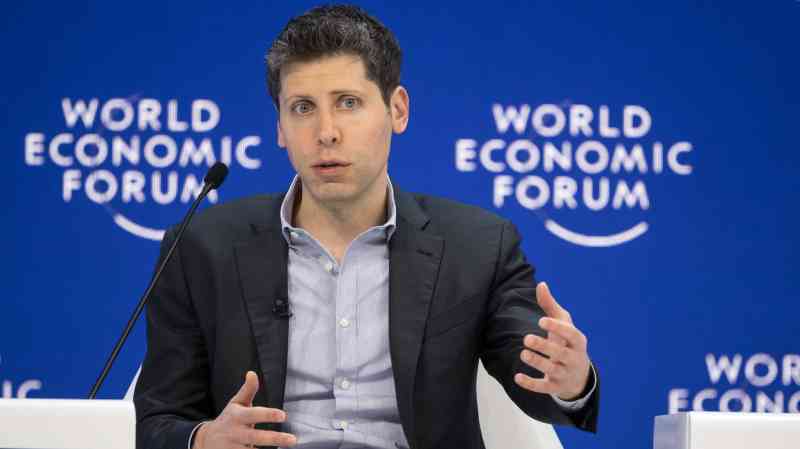If they weren’t discussing Donald Trump, delegates in Davos were pontificating on artificial intelligence and, in particular, whether the world was on the verge of another jump in productivity.
For some, the talk of “paradigm shifts” was reminiscent of 2018, when delegates (and hangers-on) at Davos went bonkers for crypto currencies and blockchain.
The AI mania was fuelled by the presence of Sam Altman, the chief executive of OpenAI, the ChatGPT creator, whose dramatic ousting, and subsequent rehiring, dominated the headlines late last year. It was Altman’s first time at the World Economic Forum, although, given how uncomfortable he looked at times, you suspect it may be his last. While Davos delegates partied on Tuesday night, he stayed in his room catching up on with colleagues on the West Coast by video call.
Speaking on the sideline of the meeting Coimbatore Sundararajan Venkatakrishnan, Barclays’ chief executive, argued that he did expect AI to result in higher productivity, but cautioned that “we do need to be humble”. Venkat cited Robert Solow, the Nobel prize-winning economist, who famously observed in the 1980s: “I see the effect of personal computers everywhere but in the productivity statistics.”
“There is very good reason to believe … that in the long-term AI will fundamentally improve productivity, even though it is very early days,” he added.
Satya Nadella, the chief executive of Microsoft and an OpenAI investor, also compared ChatGPT with the launch of the personal computer. “In 1994 … Bill Gates gave a speech titled Information at your fingertips. That was his metaphor for that age. I think this is about expertise at your fingertips,” he said when he appeared on a panel with Altman.
During one of his numerous appearances Altman argued that AI would give people space to come up with ideas and to curate decisions. “I think everyone’s job will look a little bit more like that. We will all operate at a little bit higher of a level of abstraction. We will all have access to a lot more capability. We’ll still make decisions.”
When Deep Blue, the IBM chess computer, beat Garry Kasparov, the world champion, in 1997, commentators said it would be the end of chess, Altman added, and nobody would bother to watch or play chess again because a computer had won. But “chess has never been more popular than it is now”, he said, and “almost no one watches two AIs play each other. We’re very interested in what humans do.”
But not everyone at Davos was drinking the AI Kool-Aid. Ken Rogoff, professor of international economics at Harvard University, told The Times that Davos delegates had become “too evangelical about AI” and that the technology should be subject to “neanderthal regulation” to prevent dangers in areas such as warfare. Rogoff called on governments to adopt “blunt” rules that were akin to the sweeping post-financial crisis regulations for the banking system after 2008.
Jeremy Hunt, however, told Davos delegates that governments should retain a “light-touch” approach to AI regulation. “It’s at such an emerging stage that you can kill the golden goose before it has a chance to grow,” the chancellor said. “We can do tremendously well out of AI. London is the world’s second AI hub after San Francisco and the world’s third largest tech economy after the US and China.”
Altman said he welcomed the scrutiny that AI technology was receiving. “I think it’s good that we and others are being held to a high standard. We can draw on lessons from the past about how technology has been made to be safe and how different stakeholders have handled negotiations about what safe means.”
But his off-the-cuff remark when he appeared alongside Nadella will hardly have calmed the few dissenting voices in Davos. “If AI can have more cognitive power than any of us … no one knows what happens next.”
